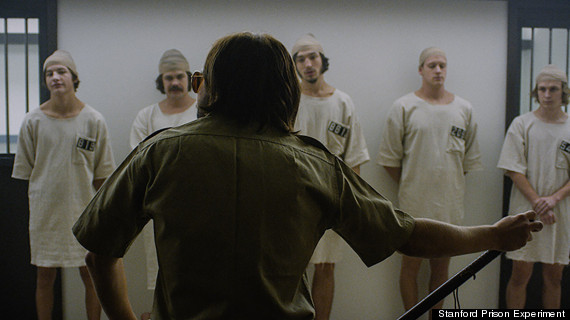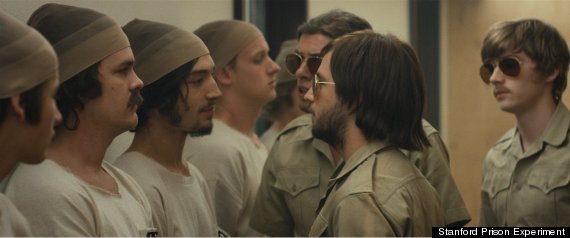
In the summer of 1971, 24 male Stanford University students volunteered to participate in a study led by Dr. Philip Zimbardo, a psychology professor interested in studying the effects imprisonment had on the human condition.
A set of offices and a hallway were converted into a barebones mock prison and the young men were split up into two groups: guards and prisoners. The experiment was supposed to be two weeks long. Zimbardo shut it down after six days.
Billy Crudup takes on the role of Dr. Zimbardo and floods the character with the perfect attributes to make him as brilliant and menacing as he seemed to be: he is maniacally driven, controlling, inspired by and truly interested in his subjects.
“This is a bigger movie than I could have even imagined,” Crudup told The Huffington Post at Sundance last week. “How do we get involved in the discussion about changing the institutions that change us?” he asked.
The film left some people at Sundance uncomfortable. A film executive sat on a bench in the theater lobby, looking exhausted: “That was just too much,” she said. But what makes the film fascinating is that it's a true story. There were few embellishments added by the filmmaker. What you see is what they got.

Perhaps what is most compelling about the experiment is how quickly the students sunk into their roles of prisoner or guard. Some were passive, some aggressive; some couldn’t wait to get out, others were desperate to stay.
“You wonder about the guards who were good but who didn’t stop the guards that were bad. And the prisoners who didn’t help the other prisoners who were breaking down. How do you address that disconnect?” Crudup asked.
The results of the Stanford Prison Experiment were so compelling and revealed so much that it has been taught in schools for decades. But instead of just shedding light on how humans respond to authority, control or power, what the experiment really showed is how much power situations have over our behavior.
The difference between a prisoner or a guard, in some cases, was a arbitrary as the flip of a coin. “Most of us have a wide capacity for behavior. We tend to think of ourselves as a formed, founded person who is just confronted with situations,” Crudup said. “But that’s not really it. The situations, in fact, are telling us who we are.”
It’s natural to consider how you would behave in those conditions. Would you be one of the good guards or would you bask in the glowing light of ultimate authority? Would you abuse that power the moment you were given a uniform?
“We can’t imagine dehumanizing another person. We can’t imagine ourselves becoming the person to do it. You want the movie to stop because you want the experiment to stop,” Crudup said.

Dr. Zimbardo was not exactly lauded for the Stanford Prison Experiment. He became so blinded by his ambition to create meaningful work that he lost sight of how real it all was, Crudup explained. He was sitting behind a camera observing; only a thin pane of glass separating him from the real suffering that the young men endured.
“I think he’s as interesting as this experiment is,” Crudup said. “[The experiment is] not necessarily accepted as academic work that holds up to scrutiny. Zimbardo became involved in a way that he maybe shouldn’t have. And yet, it’s still taught again and again. It was a provocative study that continues to help us understand who we are.”
But the conversation goes beyond just looking at who we are as humans on the inside. It also creates a dialogue about the institutions that we so blindly subscribe to in our society.
“We have created the institutions. And the institutions have then affected us. We take for granted that there should be things like prisons because what’s another alternative? But prisons haven’t always been there,” Crudup mused.
And yet it’s a guarantee that humans have always done bad things. Societies have punishments in place for bad behavior.
“As a civilized society, we can all agree that you can’t murder people. Let’s shy away from murder and stealing and shit,” Crudup said, smiling. “But the question of what an institutionalized prison is, what a school is, what healthcare is. What a government is. These are all things that we have chosen," he said. "What’s interesting about this movie is it hopefully shakes you off of that foundation just a little bit and opens your eyes to see that maybe there are other alternatives. Maybe there is a better solution.”
"The Stanford Prison Experiment" won the Waldo Salt Screenwriting Award as well as the Alfred P. Sloan Feature Film Prize at the 2015 Sundance Film Festival.

